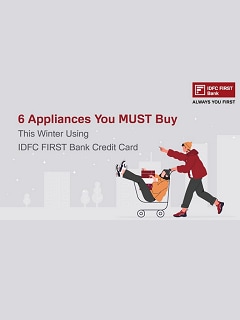CKYC Registry
-
Customer Service Contact us Service request Locate a branch
Find all the help you need
Scan the QR, get our app, and find help on your fingertips

Help CenterSupport topics, Contact us, FAQs and more
-
Login
Are you ready for an upgrade?
Login to the new experience with best features and services
-
Login
Are you ready for an upgrade?
Login to the new experience with best features and services
- Accounts
-
Deposits
IDFC FIRST Bank Deposits
View all Deposits -
Loans
IDFC FIRST Bank Loans
View all Loans - Wealth & Insure
-
Payments
IDFC FIRST Bank Payments
View all Payments -
Cards
IDFC FIRST Bank Cards
View all Cards - Blogs
- Corporate Account
-
Cash Management Services
IDFC FIRST Bank Cash Management Services
View all Cash Management Services - Supply Chain Finance
-
Corporate Lending
IDFC FIRST Bank Lending
View all -
Treasury
IDFC FIRST Bank Treasury
See more details - NBFC Financing
Support topics, Contact us, FAQs and more
- IDFC FIRST Bank Accounts
-
Savings Account
-
Corporate Salary
Account -
Senior Citizens
Savings Account -
First Power
Account -
Current Account
-
NRI Savings
Account -
TASC Institutional
Account -
Savings Account
Interest Calculator
- IDFC FIRST Bank Deposits
-
Fixed Deposit
-
Recurring Deposit
-
NRI Fixed Deposit
-
Safe Deposit Locker
-
FD Calculator
-
RD Calculator
- IDFC FIRST Bank Loans
-
Personal Loan
-
Consumer Durable
Loan -
Home Loan
-
Business Loan
-
Professional Loan
-
Education Loan
-
New Car Loan
-
Pre-owned Car Loan
-
Two Wheeler Loan
-
Pre-owned Two
Wheeler Loan -
Commercial Vehicle
Loan -
Gold Loan
-
Loan Against Property
-
Loan Against Securities
-
Easy Buy EMI card
-
Personal Loan
EMI Calculator -
Education Loan
EMI Calculator -
Home Loan
EMI Calculator
- IDFC FIRST Bank Wealth & Insure
-
FIRST Select
-
FIRST Wealth
-
FIRST Private
-
Mutual Funds
-
Sovereign Gold Bond
-
Demat Account
-
Term Insurance
-
Life Insurance
-
Health Insurance
-
General Insurance
-
Bonds
-
Loan Against
Securities -
Portfolio Management
Service
- IDFC FIRST Bank Payments
-
FASTag
-
Credit Card
Bill Payments -
UPI
-
Funds Transfer
-
Forex Services
-
Pay Loan EMI
- IDFC FIRST Bank Cards
-
Ashva :
Metal Credit Card -
Mayura :
Metal Credit Card -
FIRST Millennia
Credit Card -
FIRST Classic
Credit Card -
FIRST Select
Credit Card -
FIRST Wealth
Credit Card -
FIRST WOW!
Credit Card -
Deals
-
Debit Cards
-
Co-branded Cards
-
Credit Card
EMI Calculator -
FIRST Corporate
Credit Card -
FIRST Purchase
Credit Card -
FIRST Business
Credit Card
- Premium Metal Credit Cards
-
AshvaLifestyle1% Forex₹2,999
-
MayuraLifestyleZero Forex₹5,999
-
FIRST PrivateInvite Only
- Best for travellers
-
MayuraZero ForexMetal₹5,999
-
Ashva1% ForexMetal₹2,999
-
FIRST WOW!Zero ForexTravelLifetime Free
-
FIRST SWYPTravel OffersEMI₹499
-
FIRST Select1.99% ForexLifestyleLifetime Free
-
FIRST Wealth1.5% ForexLifestyleLifetime Free
-
Club VistaraTravelLifestyle₹4,999
-
IndiGo IDFC FIRST Dual Credit CardTravelLifestyle₹4,999
- Max benefits, Free for life
-
FIRST Classic10X RewardsShoppingNever Expiring Rewards
-
FIRST Millennia10X RewardsShoppingNever Expiring Rewards
-
FIRST Select10X RewardsLifestyle1.99% Forex
-
FIRST Wealth10X RewardsLifestyle1.5% Forex
-
FIRST WOW!RewardsTravelZero Forex
-
LIC ClassicRewardsInsuranceShopping
-
LIC SelectRewardsInsuranceShopping
- Reward Multipliers
-
AshvaLifestyleMetal₹2,999
-
MayuraLifestyleZero Forex₹5,999
-
FIRST ClassicNever Expiring RewardsShoppingLifetime Free
-
FIRST MillenniaNever Expiring RewardsShoppingLifetime Free
-
FIRST SelectNever Expiring RewardsLifestyleLifetime Free
-
FIRST WealthNever Expiring RewardsLifestyleLifetime Free
- Rewards & Credit on UPI
-
FIRST Power+FuelUPI₹499
-
FIRST PowerFuelUPI₹199
-
FIRST EA₹NVirtual1% Cashback₹499
-
FIRST DigitalVirtualUPI₹199
-
IndiGo IDFC FIRST Dual Credit CardUPITravelDual cards
- Fuel and Savings
-
FIRST PowerRewardsUPI₹199
-
FIRST Power+RewardsUPI₹499
-
LIC ClassicRewardsInsuranceShopping
-
LIC SelectRewardsInsuranceShopping
- Express and Flaunt
-
AshvaMetal1% Forex₹2,999
-
MayuraMetalZero Forex₹5,999
-
FIRST SWYPEMIOfferMAX₹499
-
FIRST MillenniaRewardsShoppingLifetime Free
- FD Backed rewarding Credit Cards for all
-
FIRST EA₹NVirtualCashback₹499
-
FIRST WOW!Zero ForexTravelLifetime Free
-
CreditPro Balance TransferTransfer & SaveReduce InterestPay Smartly
- IDFC FIRST Bank NRI Forex Solutions
-
Send money to India-Wire transfer
-
Send money to India-Digitally
-
Send money abroad
-
Max Returns FD (INR)
- IDFC FIRST Bank MSME Accounts
-
Platinum Current
Account -
Gold
Current Account -
Silver Plus
Current Account -
Merchant Multiplier
Account -
Agri Multiplier
Account -
TASC Institutional
Account -
Dynamic Current
Account -
World business
Account -
First Startup
Current Account
- IDFC FIRST Bank Business Loans
-
Business Loan
-
Professional Loan
-
Loan Against Property
-
Business Loan for Women
-
Working Capital Loan
-
Construction Equipment Loan
-
Machinery Loan
-
Healthcare Equipment Loan
- IDFC FIRST Bank Business Solutions
-
Payment Solutions
-
Tax Payments
-
Doorstep Banking
-
Point of Sale (POS)
-
Escrow Accounts
-
NACH
-
Payment Gateway
-
UPI
-
Virtual Accounts
-
As per amendment in the Income Tax Rules, PAN or Aadhaar are to be mandatorily quoted for cash deposit or withdrawal aggregating to Rupees twenty lakhs or more in a FY. Please update your PAN or Aadhaar. Kindly reach out to the Bank’s contact center on 1800 10 888 or visit the nearest IDFC FIRST Bank branch for further queries.
-
-
Most Searched
Sorry!
We couldn’t find ‘’ in our website
Here is what you can do :
- Try checking the spelling and search
- Search from below suggestions instead
- Widen your search & try a more generic keyword
Suggested
Get a Credit Card
Enjoy Zero Charges on All Commonly Used Savings Account Services
Open Account Now
Credit Card
Credit card benefits: Low APR can help you clear outstanding dues faster
Summary: Steps to get out of credit card debt include acknowledging the problem, prioritising high-interest debt payments, prepayment, budgetary provision for debt payments, and cutting out unnecessary expenses.
Credit cards can be a fantastic tool to maximize your budget, offering unparalleled rewards and benefits. However, it's important to remember that timely repayment is key for these advantages not to become liabilities. Unpaid debts due on credit accounts can unfortunately quickly spin out of control. Here we will explore how you could take steps towards managing this debt without hindrance or further complication if such a situation arises.
Low APR can help clear outstanding dues faster
Credit cards of most banks have an Annual Percentage Rate (APR) ranging from 36% to 42% p.a., which translates to a monthly interest rate of 3%-3.5%. However, certain credit cards offer the feature of dynamic APR. For example, IDFC FIRST Bank Credit Cards offer you an APR of 9% to 42% p.a. A lower APR can help you save on interest costs and clear the outstanding dues faster.
You can also use the balance transfer facility to transfer your outstanding dues from another credit card with a higher APR to your IDFC FIRST Bank Credit Card. You can then use the lower APR on your IDFC FIRST Bank Credit Card to save on interest costs and make the debt payment. As an added benefit, IDFC FIRST Bank comes with regular cashback offers from for customers availing the balance transfer facility.
Credit card rewards and benefits
IDFC FIRST Bank Credit Cards offer a host of rewards and benefits, along with a lower APR and balance transfer facility. Some of these include:
1. The credit cards don’t have any joining and annual renewal fees.
2. They offer up to 10x reward points (which never expire).
3. Reward points can be used for paying for online transactions or redeemed for gift vouchers @ Re 0.25 per point.
4. Discount and cashback offers from time to time.
5. Conversion of specific transactions or entire outstanding into loans with easy EMIs, with flexible tenure of up to 36 months.
6. Up to 20% discount on dining at 1500+ restaurants across India.
7. Secured credit cards against a fixed deposit for people who don’t have a CIBIL score or income source. The credit limit can be up to 100% of the FD amount.
These are some of the many credit card benefits. But what if someone is caught in a credit card debt trap? Here are some ways to pay off the debt if you get trapped in one.
5 Ways to get out of credit card debt
If you are caught in a credit card debt trap, here’s how you can get out of it.
1. Acknowledge the problem
The first step to finding a solution to any problem is to recognise and acknowledge it. So, to get out of a credit card debt trap, first recognise it and acknowledge it. If you have multiple credit cards with outstanding, do the following:
• Write down the names of the cards on a piece of paper or an excel sheet.
• Note the outstanding amount against each card and the due dates.
• Calculate the total outstanding amount for all cards.
2. Prioritise essential debt payments
Now that you know the outstanding against each card, and the total for all cards, it is time to prioritise the repayments. You can consider one of these steps or a combination for repayment:
• Prioritise the repayments of credit cards that have a higher APR. The higher the APR, the more interest you have to repay and the longer it will take to clear the outstanding.
• Prioritise the repayments of credit cards with the lowest outstanding amount. It helps you to clear the total outstanding for these credit cards and later focus on the ones with a higher outstanding amount. The lower the number of cards you have to focus on, the better it helps to manage the repayment.
• Use the balance transfer facility to transfer the outstanding from credit cards with higher APR to credit cards with lower APR to save on the interest cost. It will help you consolidate the outstanding on multiple credit cards into a single card.
• Convert the outstanding amount into easy EMIs at a lower interest rate.
3. Prepay and automate
If you have any additional free cash flows, use them to make prepayments of outstanding debts. The source of additional free cash flows can include salary bonus, raise, maturity proceeds from short-term investments, etc.
Automate the repayment of loans using the auto-debit feature. It ensures timely payment and helps you avoid any late fees, penalties, etc. Preferably, choose the repayment date within 3-5 days of getting your salary. That way, you can make the debt repayment first and then use the remaining money for your regular expenses.
4. Review your monthly budget
While making your monthly budget, always make a provision for debt repayment. You have already made a list of the outstanding on all cards and have also decided the priority of the repayments. Based on this, set aside the amount in the monthly budget and then use it for repayment.
You can use a method like 50/30/20 budgeting which categorises your income into the following 3 spending categories:
• 50% towards needs
• 30% towards wants
• 20% towards savings and investments
You can include the amount for debt repayment in the 20% category meant for savings and investments.
5. Cut back on unnecessary expenses
While making your monthly budget, sometimes you may not have enough money to make a provision for debt repayment. In that case, you will have to identify unnecessary expenses or those that can be postponed.
Here are some ways to avoid or cut down on expenses:
• Stop dining out for some time and relish home-cooked food instead.
• Avoid going to multiplexes; instead, watch movies on DTH channels.
• Purchase garments and personal accessories once a quarter, preferably during a sale.
• While travelling to the office, carpool with colleagues to save on fuel costs.
• Unsubscribe from certain paid subscriptions like OTT platforms, music and gaming apps, online magazines, etc., for a while till your debt is repaid or is in control.
• For one year, instead of going for an international family vacation, take a domestic vacation. If you take domestic vacations every year, choose a low-cost destination or skip the vacation for one year.
Conclusion
A combination of some or all the above options will help you save a considerable amount of money. The saved amount can be used to repay the credit card outstanding. Getting into a credit card debt trap is not difficult, it just takes time and discipline. The five steps outlined above can help you get out of one. Once you get out of debt, use your credit card responsibly and ensure timely repayments so that you don’t ever fall into the same trap again.
Disclaimer
The contents of this article/infographic/picture/video are meant solely for information purposes. The contents are generic in nature and for informational purposes only. It is not a substitute for specific advice in your own circumstances. The information is subject to updation, completion, revision, verification and amendment and the same may change materially. The information is not intended for distribution or use by any person in any jurisdiction where such distribution or use would be contrary to law or regulation or would subject IDFC FIRST Bank or its affiliates to any licensing or registration requirements. IDFC FIRST Bank shall not be responsible for any direct/indirect loss or liability incurred by the reader for taking any financial decisions based on the contents and information mentioned. Please consult your financial advisor before making any financial decision.
The features, benefits and offers mentioned in the article are applicable as on the day of publication of this blog and is subject to change without notice. The contents herein are also subject to other product specific terms and conditions and any third party terms and conditions, as applicable. Please refer our website www.idfcfirstbank.com for latest updates.























